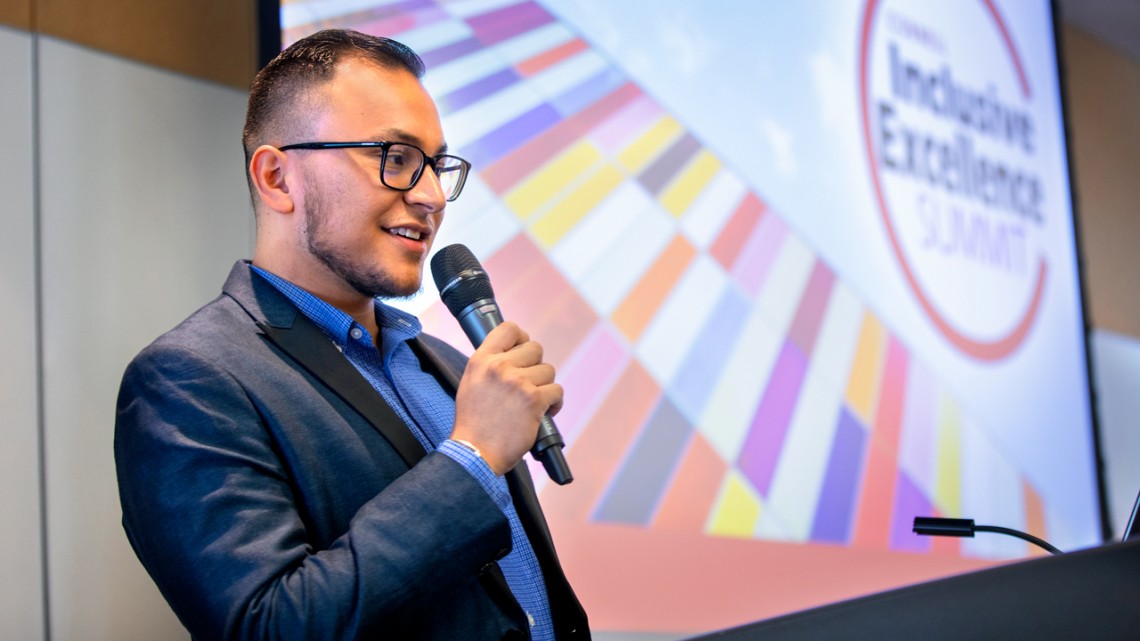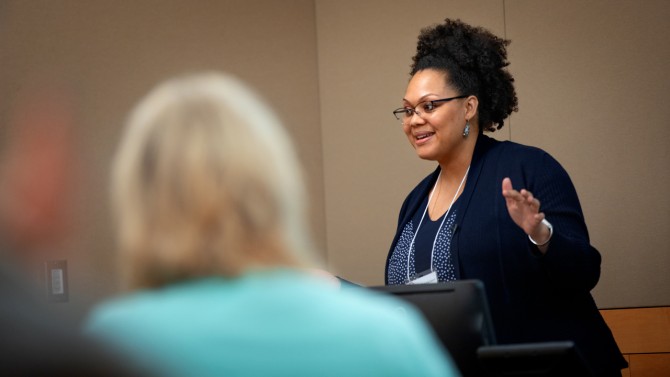
Anthony Sis, of the Department of Inclusion and Workforce Diversity, welcomes participants at the Inclusive Excellence Summit, June 11 in the ILR Conference Center.
Inclusive excellence: Fostering belonging at Cornell
By Daniel Aloi
More than 100 participants from across campus attended the first Inclusive Excellence Summit June 11, with workshops and facilitated sessions for Cornell staff.
Session topics included unspoken narratives in the workplace; allyship and intersectionality; exploring identity; cultural intelligence in a diverse and global world; retaining and supporting employees of color; creating a culture of inclusion for the deaf and hard of hearing; and key initiatives of the Alliance for Diversity and Inclusion.
The offerings also included “Balancing Work, Life and Disability,” “Understanding Microaggressions,” “Leading and Managing Culturally Diverse Teams” and an interactive session to end the day, “It Starts With Us: Becoming Agents of Change.”
“We are an organization of almost 18,000 employees,” Mary Opperman, vice president and chief human resources officer at Cornell, said in her opening remarks. “And we are decentralized. As we aspire to create the workplace that we know will get and keep the talent we need, we need to recognize that we often make incremental steps. And sometimes we make bigger steps in one part of the organization than we do in another.”
Sharing “a little bit about what diversity and equity mean to me personally,” she said: “I learn the most when I’m open to listening without judgment to people when they are struggling. Because that’s when people are the most honest and open, if you create an environment where they feel safe to be themselves. So I enjoy the interactions that are guided by another person who trusts me enough to teach me something I don’t know.”
Angela Winfield, associate vice president for inclusion and workforce diversity, said the summit comes at a time when the university is “moving into a new framework for diversity, equity and inclusion at Cornell, and we’re calling it ‘Belonging at Cornell.’
“That name may evoke some feelings in you, and it’s meant to,” Winfield said. “Climate is a feeling; you can tell when something doesn’t feel right, or when it feels great. And ‘Belonging at Cornell’ isn’t about conforming to Cornell, it’s about being able to feel like you can bring your authentic self to work.”
Opperman said: “We want to be sure that our staff can see themselves in the values and the mission of our organization. So we are building diversity, equity and inclusion into the strategy that we have in Human Resources, which fits into the strategy of the university.”
Analytics are important to that effort. “Data matters,” she said. “For example, we now know the generational makeup of our workforce and how it differs from the U.S. workforce. … 62% of our new hires last year were millennials, increasing that cohort of our workforce from 3% to 23%.”
Survey data is used, along with anecdotal testimony, to assess the impact of inclusion and diversity efforts across campus, and identify what can be improved, Winfield said.
In the presentation “Building a Climate of Belonging at Cornell,” Linda Croll Howell, director of analytics for the Division of Human Resources, discussed staff engagement findings from a series of surveys she has conducted at the university. “What we’ve learned … is that engagement in general builds [and changes] over somebody’s time with Cornell.”
Howell said the surveys have been designed to support the university’s diversity and inclusion priority. “We really wanted to understand belonging across the whole talent continuum, from when someone first comes to Cornell to when they leave,” she said.
Among the findings: Those who join the university and already know someone here report a greater level of agreement with the statement “I feel like I belong at Cornell.”
“Other research we’ve been doing on engagement in general has shown that experiences in an employee’s first 90 to 120 days with the university is critical for someone making determinations of whether or not they see themselves here long term,” Howell said. “We found that the importance of having that really positive orientation experience led to greater success.”
A series of climate/inclusivity surveys have been conducted since 2017, in Alumni Affairs and Development, the College of Veterinary Medicine, the Smith School of Chemical and Biomolecular Engineering, Student and Campus Life, and the Lab of Ornithology. A new staff exit survey was instituted in January.
“Belonging is different for different populations,” Howell said. “What appears to make the difference is not based specifically on someone’s identity, but rather what behaviors and experiences they’ve had since coming to Cornell.”
Anthony Sis, a training specialist in the Department of Inclusion and Workforce Diversity, helped organize the summit. “My goal for this event was to inspire and empower staff by communicating the message that fostering a diverse and inclusive workplace benefits everyone at Cornell,” Sis said. “Based on the energy, engagement and feedback thus far, I think we are well on our way to advancing this goal.”
The Inclusive Excellence Academy will next hold a seminar July 17 in G10 Biotechnology: “See Something, Do Something: Responding to Unfair Treatment.” Register online.
Media Contact
Get Cornell news delivered right to your inbox.
Subscribe

